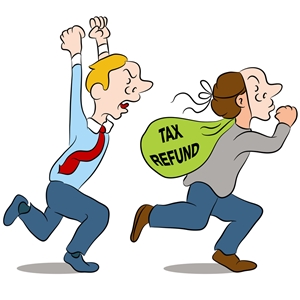Imagine a burglar breaks into your home while you’re at work. The thief doesn’t steal jewelry, your TV or your favorite collectible. Instead, the thief heads directly to the home office files and steals your tax documents and bills where you’ve organized your records alphabetically to make them easier to find. The thief checks out your basement, closet and upstairs attic for boxes that look like they contain financial records. The thief walks out with paper.
 All in all, the paper value of the loss is negligible, but the thief has stolen all of your and your family members’ personal information and private financial data. The end result is that you and your loved ones could suffer hundreds of thousands of dollars or more in identity-theft related damages that may follow you the rest of your lives. It could also affect your taxes.
All in all, the paper value of the loss is negligible, but the thief has stolen all of your and your family members’ personal information and private financial data. The end result is that you and your loved ones could suffer hundreds of thousands of dollars or more in identity-theft related damages that may follow you the rest of your lives. It could also affect your taxes.
Tax documents in particular contain your and your dependent’s tax and personal information including receipts, old W-2 forms and bank account information. Experts point out that all documents containing your financial, health and tax information, especially records with your Social Security number on them, should be kept securely.
Most of us are being more diligent about using passwords and keeping digital connections and information about our personal data secure online. However, many taxpayers may have forgotten about the old paper copies that remain unprotected and vulnerable. Almost daily the IRS uncovers new scams using stolen identities. These scammers file fake tax returns under legitimate taxpayer Social Security numbers seeking refunds. The stolen IDs come from online and paper copy sources.
The issue is that taxpayers are supposed to keep records but doing so may provide an opportunity for someone else to take advantage. Regulations mandate that we keep a record of our tax returns and their supporting documents (receipts, statements, etc.) for a minimum of three years to a maximum of seven years. Additionally, we are to keep records related to a property we own for three to seven years after disposing of it.
To keep things safe, if you keep paper tax records, make certain they are stored in a locked and secure area such as a locked desk drawer, locked file or safe. Consider scanning your records instead and saving them electronically in encrypted files, both on your computer and your hard drive back-up. This also applies to all financial and health records that contain your personal and account information.
Converting paper files to digital files takes time and may require a scanner and a small investment in software to accept scanned documents (though many printers today serve that function). Remember that you’ll need encryption software. Make certain you keep your passwords in a secure place as well. You may also request electronic versions of your tax documents from your tax preparer, who should already be submitting your records in an electronic version to the IRS.
Dispose of paper tax records by shredding them first. If you are disposing of an old computer or any other product with a hard drive, remember that just “deleting” a file does not erase it completely from the computer. Electronic products that can hold data should be “wiped” to ensure all data is wiped out. This will require specialized disk utility software. Your computer, your mobile phones and tablets, most printers, copiers and all other electronic devices that can save files should be wiped before disposal.
To keep your computer files secure from an online thief, experts recommend you use reputable security software that updates automatically with essential tools including a firewall, virus and malware protection and file encryption options for sensitive data. Use strong passwords, protect them and back up your files regularly.
An IRS publication sums it up this way, “Treat your personal information like cash, don’t leave it lying around.”
 is now
is now 
